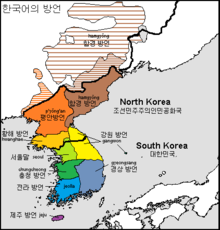Central Korean
| Korean | |
|---|---|
|
Native speakers
|
76 million (2007) |
|
Koreanic
|
|
| Dialects |
|
| Language codes | |
| ISO 639-3 | |
| Glottolog | kore1280 |
 |
|
A number of Korean dialects are spoken in the Korean Peninsula. The peninsula is extremely mountainous and each dialect's "territory" corresponds closely to the natural boundaries between different geographical regions of Korea. Most of the dialects are named for one of the traditional Eight Provinces of Korea. One is sufficiently distinct from the others to be considered a separate language, the Jeju language.
Despite North–South differences in the Korean language, the two standards are still broadly intelligible. One notable feature within the divergence is the North's lack of anglicisms due to isolationism and self-reliance—pure/invented Korean words are used in replacement.
Korea is a mountainous country, and Korean is consequently divided into numerous small local dialects. There are few clear demarcations, so dialect classification is necessarily to some extent arbitrary. Nonetheless, the following divisions are commonly cited in the literature:
A recent statistical analysis of these dialects suggests that the hierarchical structure within these dialects are highly uncertain, meaning that there is no quantitative evidence to support a family-tree-like relationship among them.
...
Wikipedia
